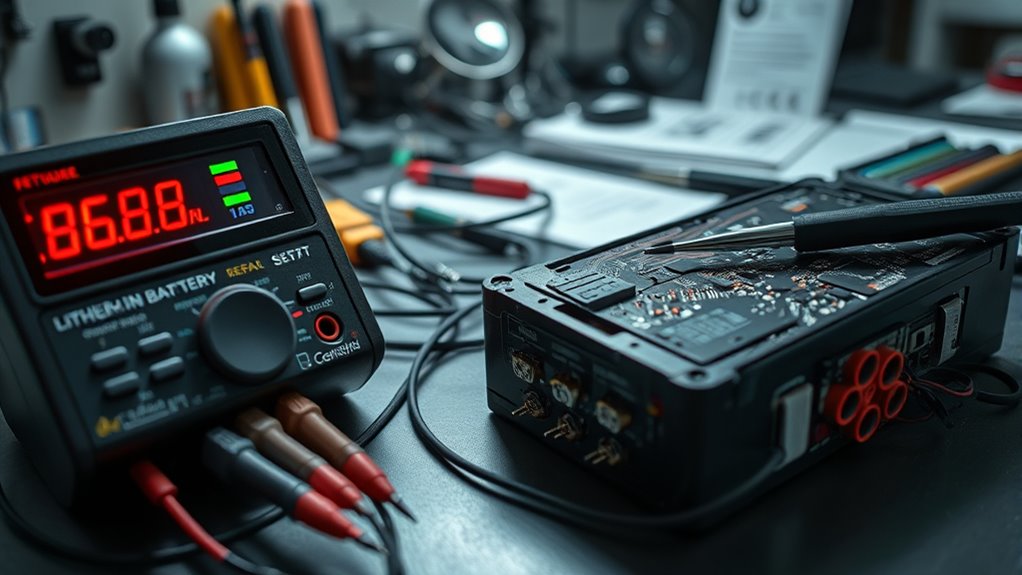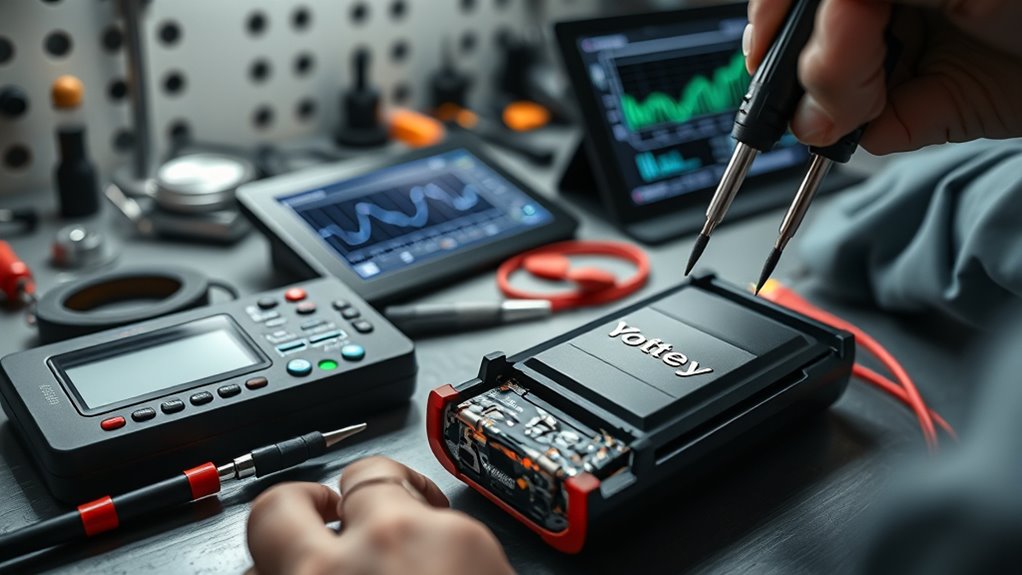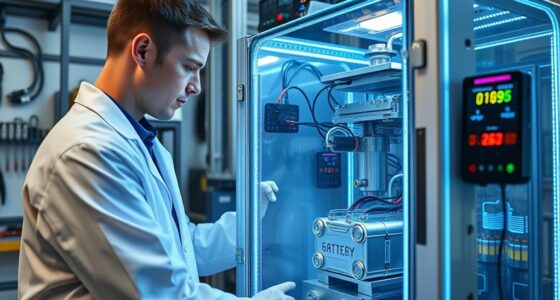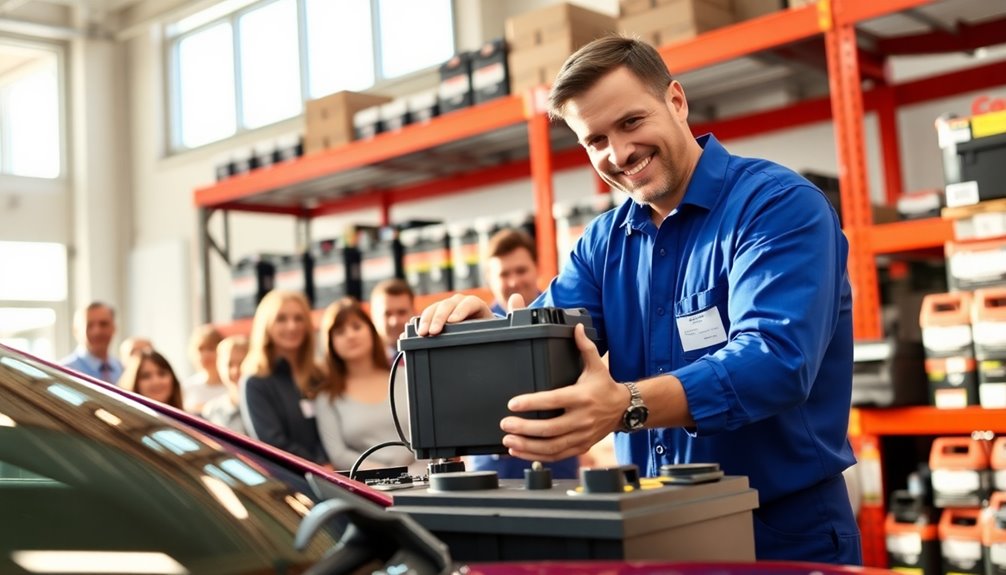To effectively diagnose and repair your battery, you’ll need specialized tools like multimeters, conductance testers, and load testers to accurately assess voltage, capacity, and overall health. Expertise from trained technicians is essential to interpret results, perform precise repairs, or determine if a replacement is necessary. Proper evaluation ensures safety and reliability, saving you money in the long run. Keep going to discover how these tools and skills work together for ideal battery care.
Key Takeaways
- Proper diagnostic tools like multimeters, conductance testers, and load testers are essential for accurate battery assessment.
- Skilled technicians interpret test results to identify issues such as voltage drops, capacity loss, or internal damage.
- Repair techniques include cleaning terminals, reconditioning cells, and restoring electrolyte levels to prolong battery life.
- Professional evaluation determines whether repair is feasible or if replacement is more cost-effective and reliable.
- Expertise ensures proper testing, diagnosis, and application of maintenance or repair methods tailored to specific battery types.

If your vehicle or electronic device isn’t holding a charge like it used to, it might be time for professional battery diagnostic and repair services. When you notice your battery struggling to start your car or power up your gadgets, it’s essential to pinpoint the root cause quickly. This is where battery testing comes into play. Skilled technicians use specialized tools to evaluate your battery’s condition, checking factors like voltage, cold cranking amps, and overall capacity. These tests help determine whether your battery is simply drained or if it’s nearing the end of its lifespan. Proper diagnosis guarantees you don’t waste money on unnecessary replacements or overlook an underlying issue that could cause future failures.
Once the testing phase confirms the battery’s health, repair techniques come into focus. Not all battery problems require replacement; many can be fixed through targeted repairs. For instance, if corrosion is present on the terminals, technicians clean and restore the connection, improving conductivity and performance. In cases where the internal components have degraded but the casing remains intact, some repair shops can recondition the battery by replacing faulty cells or adding distilled water to restore electrolyte levels. These repair techniques are cost-effective and environmentally friendly, extending your battery’s usability without the need for a full replacement. Understanding battery chemistry is crucial for effective reconditioning and maintenance practices.
Targeted repairs like cleaning terminals or reconditioning cells extend battery life affordably and eco-consciously.
However, it’s essential to recognize when repair isn’t sufficient. If your battery is old or severely damaged, replacement might be the safer choice. But before jumping to that conclusion, professionals rely on their expertise to evaluate whether a repair can restore reliability or if new batteries are warranted. They also consider the specific requirements of your vehicle or device, ensuring the right type and size of battery is used, which is critical for peak performance and longevity.
The tools used during this process are highly specialized. Multimeters and conductance testers quickly assess voltage levels and internal resistance, providing immediate insights. More advanced diagnostic equipment may perform load testing, simulating real-world usage to see how the battery responds under stress. These diagnostic tools, combined with your technician’s experience, form a thorough approach to maintaining your battery’s health.
Frequently Asked Questions
How Often Should I Have My Vehicle’s Battery Checked?
You should have your vehicle’s battery checked at least once a year as part of your maintenance schedule, especially if your battery is nearing the end of its lifespan or if you notice starting issues. Regular inspections help catch potential problems early, preventing unexpected breakdowns. If you live in extreme weather conditions, consider more frequent checks. Staying on top of your battery’s health guarantees reliable performance and extends its overall lifespan.
Can a Faulty Battery Affect Other Vehicle Electronics?
A faulty battery can definitely impact your vehicle’s electronics, causing issues like dim lights or glitchy systems. Corrosion on terminals and alternator problems can hinder power flow, leading to electronic failures. Think of your battery as the heart of your car’s electrical system—when it’s compromised, it disrupts the entire network. Regular checks help catch corrosion or alternator issues early, preventing costly repairs and keeping your electronics running smoothly.
What Are Signs My Battery Needs Professional Repair?
If your vehicle shows signs like slow engine starts, dim headlights, or frequent electrical issues, your battery might need professional repair. Look for battery corrosion around the terminals and check your charging system’s performance, as these are common indicators. A trained technician can diagnose and fix problems, ensuring your battery operates properly and preventing further damage to your vehicle’s electronics. Don’t ignore these signs; early repair saves you time and money.
Are Battery Diagnostics Safe for All Vehicle Types?
Battery diagnostics are generally safe for all vehicle types, like a gentle handshake that reassures you. Modern diagnostic tools prioritize battery safety, ensuring no harm comes to your vehicle or its electrical system. Professionals use specialized equipment designed for different vehicle models, so you can trust that your car’s battery will be handled with care. Always have diagnostics performed by trained technicians to keep your vehicle running smoothly and safely.
How Long Does a Typical Battery Repair Process Take?
A typical battery repair process usually takes about one to two hours, depending on the issue. You’ll find that repairs can help extend your battery’s lifespan and often cost less than a full replacement. During this time, technicians diagnose the problem, perform necessary repairs, and guarantee your battery functions properly. Quick repairs save you money and keep your vehicle running smoothly, minimizing downtime.
Conclusion
With the right tools and expertise, you can breathe new life into tired batteries, turning them from silent, uncooperative giants into reliable powerhouses. Think of these services as a skilled doctor for your batteries, diagnosing hidden ailments and prescribing the perfect remedy. When you invest in proper diagnostics and repairs, you’re releasing a treasure chest of energy, ensuring your devices run smoothly like a well-oiled engine. Empower your batteries—let them shine brighter and last longer.










